COVER- 'Cued up: Local show goes viral

The Midnight Barbecue hosts Nick Noe and Adam Gottschalk have a real studio in their apartment.
PHOTO BY JAY KUHLMANN
It's a typical taping night for the Midnight Barbecue. Guests are offered a beer and ushered into the green room, and the producer checks camera angles while the hosts chat with a guest who was beaten raw by a dominatrix on last week's show.
In the tradition of do-it-yourself talk shows pioneered by Wayne's World, the "studio" is the spare bedroom in the hosts' apartment. Unlike its cable-access predecessor, however, this apartment is courtesy one of the show's sponsors, the massive GrandMarc at the Corner. So are the electronics (thank you, Crutchfield). And the beer in the green room's kegerator? That would be from Starr Hill, yet another sponsor.
This is the Midnight Barbecue. Wayne Campbell, eat your heart out.
***
The Midnight Barbecue, launched almost a year ago, is the brainchild of Adam Gottschalk, a 20-something sportscaster for the Virginia Sports Network (heard locally on AM radio station WINA). Late in 2006, Gottschalk found himself sitting around talking to UVA football players Gordie Sammis and Ian-Yates Cunningham.
"Someone walked into the living room and said this should be a show," he says.
So they did a few pilots in the WINA studio. "We started talking about sports," says Gottschalk, "and realized we didn't want to talk about sports any more than we had to."
He thought the show needed to be funnier.
"I scrolled down my phone, got to Nick, and said, 'He's funny,'" recalls Gottschalk of his co-host, Nick Noe.
The two had grown up in the same neighborhood (Noe's house often the scene of milk-chugging contests), but they hadn't hung out since their days at Albemarle High School.
The show debuted on radio and public access March 9, 2007. The football players moved on, and Noe and Gottschalk settled in as the show's hosts– with another Albemarle grad, David Dillehunt, as the producer.
Local musicians are frequent guests on the 90-minute segments. Tonight, it's regular Helen Horal, who's just released a CD. "I got a wedding," she enthuses, "from someone who saw me on the Midnight Barbecue."
Corey Gross from the the bluegrass band 6 Day Bender is back to talk about what it's like to be dominated, as he was on last week's show. "I saw the bruises," says Horal.
"I didn't realize it was that bad," says Gross. "I'd probably do it again. I liked it, painwise."
And let's pause for a break.
The featured guest tonight is Mike Stark, the guy who was thrown to the floor at the Omni for demanding to know whether incumbent Senator George Allen ever spit on his wife.
"Mike Stark has pissed off more people than anyone we've ever had on the Midnight Barbecue," Gottschalk introduces, rolling a video of Stark showing up at Fox commentator Bill O'Reilly's house.
"He's a lying douchebag," says Stark.
"And you don't like him?" says Noe.
"Should we say the word allegedly?" asks Gottschalk.
The Stark show is the first Midnight Barbecue about politics. More typical is the Corner Crawl, in which bartenders tell favorite tales. Then there's regular Robert Combs, who calls himself a street person and sings songs about masturbation. Or a karaoke lesson from a rural Virginia expert. Or watching Starr Hill brewmaster Mark Thompson blind-tasting light beers.
They tape the show twice a week, and it airs at midnight Fridays and Saturdays on WVAX 1450, progressive talk radio. A version of the show called the "Midnight Barbecue Jam Session" airs at midnight on Monday at 106.1 the Corner. Both stations, perhaps not coincidentally, are owned by Gottschalk's employer, the Charlottesville Radio Group.
"I have incriminating photos of almost everyone at the station, so we were able to get it on the air," he jokes.
The 'Cue also has the midnight slot Friday and Saturday on public access Channel 13.
But all that's old media strategy. The new twist is making podcasts of the show available for download at viewers' convenience. They're getting 1,000 hits a day on YouTube, Gottschalk says, and with a target audience of college students and 20somethings, they've hit advertising gold.
That raises the next question: Can a radio talk show on the Internet actually make money?
Locally grown
"I always thought I was going to be a major-league baseball player," says Gottschalk, describing his path into sports broadcasting. Despite his youth– he's 23– he's been in radio for seven years.
"A friend of mine was interning for Mac McDonald, the voice of the Cavaliers," at WINA, he says. "I started coming in every morning in high school."
Growing up in a house without television on a llama farm outside Charlottesville, when he wanted to catch a ball game, he listened to the radio. And he stayed in Charlottesville to go to UVA so he could continue working on the radio.
Now a full-time broadcaster of UVA sports for the Virginia Sports Network, Gottschalk has what many might consider a dream job. Yet he estimates he puts another 40 hours a week on the Midnight Barbecue, doing sales, programming and editing, along with hosting.
The Charlottesville Radio Group is supportive, he says, noting that Midnight Barbecue "is definitely bringing in younger people."
What if the Midnight Barbecue becomes a full-time opportunity?
"I'm a sports guy," he stresses. "I don't see myself getting out of sports. I've had the opportunity to leave [Charlottesville] before. As long as I can keep the balance between the two, I'd like to keep on."
While Gottschalk has pursued a career on the air for years, for Noe, 24, being on a radio comedy show is something new. "I'd never considered doing it," he says. "I'd always liked comedy and comedians but never saw myself pursuing it. It's kind of flattering that Adam called. He's a big radio name around town."
After attending James Madison University, Noe now works in marketing for the UVA Medical Center, but he spends three to four hours booking guests, doing research, and coming up with on-air bits for each show.
"Sometimes I feel like I'm the Robin to [Gottschalk's] Batman," he says, but mostly it's a pretty equal partnership, especially when it comes to content and material.
Noe's other contributions to the show are visible in the studio. Tonight's the debut of a new table he and his father made.
"I strategically built this with us up so we could look down on our guests," he says.
Noe also gets credit for the black sheets draping the walls of the studio to hide the fact that it's a bedroom.
"Nobody can handle a thimble and needle like Nick Noe," observes Gottschalk.
Both hosts are amazed at the people they run into who've seen their work.
"I can't get over the fact that people watch the frickin' thing," says Gottschalk, who, with Noe, co-hosts the Charlottesville Music Showcase, a free weekly concert currently headquartered at Rapture restaurant. "A guy in the audience flipped out and said he watches the show all the time," he says.
"I run into people all the time who have," agrees Noe. "People at work say, 'I saw your show.'"
The third member of the Barbecue team, David Dillehunt, doesn't get the face time, and that's fine with him.
Dillehunt, 23, is the man behind the curtain, the show's production guru. Never seen on air, he's referred to as Bruno, the show's Brazilian camera man.
Dillehunt's day job is as a contractor with the city of Charlottesville communications department, running the public access station and recording City Council and School Board meetings, events that pre-empt taping the Midnight Barbecue. He also hosts his own radio show, the Localmotive, on WNRN.
And following in the footsteps of Trevor Moore, a Charlottesvillian who now has his own regular sketch comedy show on the Independent Film Channel, Dillehunt hosted Caught In the Act, which premiered on public access the year after Moore left for bigger and better things.
"We got his time slot in January '99," says Dillehunt. For five years Dillehunt created, wrote, and improvised what he calls "a crude, kid's SNL."
"We were 15," he notes.
The production values of the Midnight Barbecue, which uses four cameras in the studio, are 10 times better than most public access and would rate a seven or eight on a broadcast scale of 10, Dillehunt says.
"It's overproduced for cable access. If we could get on broadcast or cable, it would need very little," he explains.
Like the show's hosts, Dillehunt lives in a bedroom at the GrandMarc apartment, and has had to adjust to life in the middle of 500 college students.
"I didn't live the college life," he says.
***
Team 'Cue was ready to syndicate the show on TV, and they claim it had seven stations ready to broadcast it last fall.
"We kept changing the direction," says Gottschalk. Was it a TV show? A radio show? "–and then this Internet thing."
He sees consistency and direction as the keys to success for a show that he says was pretty profitable last year and sold out its advertising in March. Finally, they settled on a direction.
"We're a late night radio show intended for colleges that we tape in our fourth bedroom," says Gottschalk. And with the success of YouTube, going after the college market with the Internet seems a natural– and possibly shrewd– move.
"A lot of younger people don't watch TV or listen to radio," Gottschalk points out.
"It's a new frontier," says Noe. "There's the TV generation that will record and watch. The next generation is, 'I want to watch it now, and I'm going to download and watch.'"
When the Midnight Barbecue stages events, Gottschalk mass-messages his Facebook group. "I have 733 friends," he says.
That's how Helen Horal got involved. She Facebooked the Midnight Barbecue, and eventually achieved guest host status.
"I had a page as Midnight Barbecue," says Gottschalk, "but I got kicked off Facebook because no one is named Midnight Barbecue."
"But if he was," Noe interjects, "he'd be a pretty cool guy."
Cross promoting the 'Cue
Each segment begins, "This is the Midnight Barbecue at the Crutchfield.com Studio in the GrandMarc in Charlottesville, Virginia."
Behind the hosts, flattened Starr Hill Brewery cartons form "MB" on the wall.
"I hope in a year we'll be like NASCAR with sponsors all over our bodies," says Gottschalk. "You think I'm kidding? I'll sell my own naming rights. I'll be Adam Gottschalk presented by Pepsi."
A banner for WVAX 1450 AM progressive talk radio and 106.1 the Corner also adorns the studio.
The first station they pitched the show to was the Corner, because of its success as the new radio station in town.
"When Adam first came to me with this idea, I was skeptical about a talk show hosted by college people," says Corner program director Brad Savage. "Our slogan is 'It's about the music,'" and a talk show wasn't part of the format.
Gottschalk believes the turning point was a Justin Timberlake ticket giveaway. One of his Charlottesville Radio Group colleagues, Mike Bisceglia, had an extra ticket for the show. "We said we'd give it away to get him a date," says Gottschalk. He emailed his Facebook group and had a barbecue in the station's parking lot on Rose Hill Drive.
"A hundred people showed up with one day's notice," recounts Gottschalk. "Brad Savage walked out and saw 100 people in the parking lot with us giving away tickets. He's a smart businessman."
Savage has seen the college-guys-do-a-talk-show idea pitched at other stations.
"They've gone from this idea that I thought would fizzle out," he says. "They've built it into quite a little brand with Facebook and MySpace. They have the right idea."
He applauds the Midnight Barbecue for taking a late slot at WVAX 1450. And, Savage notes, they found sponsors and advertisers that aren't advertising on other stations, some of them smaller businesses and restaurants catering to students.
"It's a viral, social network," says Savage. "They have this word-of-mouth following."
And by using the Internet, "It seems like it's taking on a life of its own through YouTube and the podcasts," he adds. "It's exciting it's so web-based."
Other radio stations do podcasts, but they're usually news or music, not on-demand talk shows, says Savage.
"A lot of businesses want to reach our audience of 18 to 30," says Gottschalk. But snagging cash-paying advertisers wasn't a given, especially when one doesn't have ratings and is speaking the new language of YouTube hits and Facebook friends.
"The key for me is they're all about the new media," says brewmaster Thompson. "We're trying to position the Starr Hill brand in a way that's new and unique. Beer marketing is very old school, and the niches are very crowded.
"The new viral Facebook is out of the mainstream," Thompson continues. "Right now it's too early to tell, but I'm excited for their success. It doesn't really cost us anything, and it puts our product in the hands of trendsetters."
Thompson says he's amazed at the amount of equipment the show got from Crutchfield. "People opened their arms," says Thompson. "We're all looking for the best new idea. We're all searching for these new media."
But the Midnight Barbecue has already discovered one pitfall of trades.
"Starr Hill gave us a keg, and it was gone the next day," confesses Gottschalk. "We were kind of embarrassed to go back and ask for another."
***
The Midnight Barbecue strategy coincides with a lot of things happening in the radio industry now, according to Sean Ross at Edison Media Research. He foresees more program-driven radio with content that can be downloaded on an iPod as radio tries to reclaim younger listeners.
"Talk radio moved to FM in the last 10 years," says Ross. "Broadcasters are trying to build young male shows. There are never enough of these shows.
Broadcasters are learning to think of their stations as websites with FM transmitters, he says.
"They're smart to establish a brand," he adds. "Obviously it's hard to launch a show nationally. They're being smart to do it on multiple platforms."
Radio analyst Tom Taylor at Radio-Info.com agrees. "What Midnight Barbecue's doing," Taylor says, "is the sort of cross-pollination that folks in radio would like to see a lot more of– even though the ultimate direction may point away from traditional AM/FM.
Tools like Facebook and other Internet sites should be expected, Taylor says. "They're– as Irving Berlin wrote in Annie Get Your Gun– doing what comes naturally to people of their generation."
"No question it's fertile ground for new opportunity," says Al Peterson, who writes a daily and weekly newsletter for all things talk radio. "PCs are almost as ubiquitous as radios in people's homes."
But can a venture such as the Midnight Barbecue be profitable?
"The short answer is yes," says Peterson, cautioning that while a lot of radio shows end up on the Internet, not a lot of Internet shows end up on radio.
"Much like Matt Drudge's news aggregator, several of us could retire on his advertising income." says Peterson.
For a show like the Midnight Barbecue, "Maybe it won't be an immediate success," Peterson says, "but the future's so bright you've got to wear shades."
Next on the Midnight Barbecue
Gottschalk envisions a summer tour in an RV, preferably with a sponsor like Red Bull.
And he says the Midnight Barbecue has another ambitious goal: "to create a new Easters in terms of a music festival." Make that three festivals coming up in the summer and spring.
He's already taken the Midnight Barbecue on a road trip, traveling to New Jersey with rappers Beetnix.
"I love those guys," says Damani Harrison, Beetnix cofounder (and former Hook music reviewer). "It was awesome. I didn't know how popular they are, but after the show aired, I was walking into gas stations and 7-11s for months and people would say they saw the show. I got stopped on the street. I didn't know so many people watched public access."
Will Anderson of Sparky's Flaw has known Gottschalk a long time, and he plans to be on the show. "I know plenty of people, especially in the music scene, who watch the show," says Anderson. "It's one of those niche things. People love it."
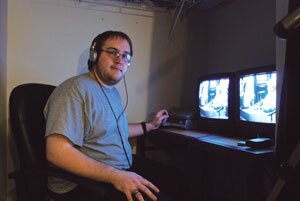
David Dillehunt is the technical wizard behind the Midnight Barbecue, and he's done his own public-access sketch comedy show.
PHOTO BY JAY KUHLMANN
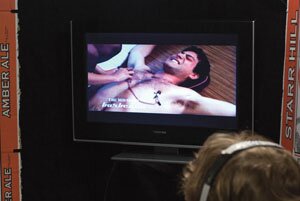
Corey Gross from 6 Day Bender gets nipple clamps on a show that featured a dominatrix.
PHOTO BY JAY KUHLMANN
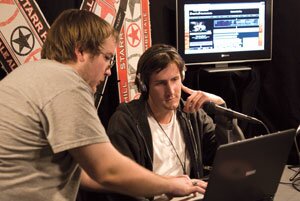
David Dillehunt tweaks equipment for roommate and Midnight Barbecue co-host Nick Noe in their sponsor-provided apartment.
PHOTO BY JAY KUHLMANN
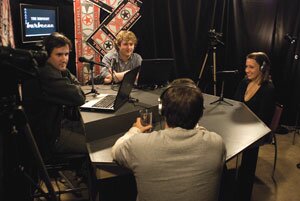
Nick Noe, Adam Gottschalk, and singer Helen Horal listen to Corey Gross' account of being dominated on the previous week's show.
PHOTO BY JAY KUHLMANN
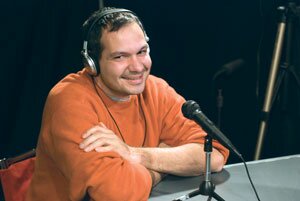
Guest Mike Stark, who was tackled at a George Allen event in the Omni, dishes political dirt.
PHOTO BY JAY KUHLMANN
#
5 comments
Deep down in my heart I have always known that David Dillehunt was Bruno... part of me still doesn't want to believe it... Well, there is The Kübler-Ross model which describes, in five discrete stages, the process by which people deal with grief and tragedy - and believe me, finding out that Bruno is not an actual person is a tragedy!
The stages are:
Denial: The initial stage: "It can't be happening."
Anger: "Why me? It's not fair."
Bargaining: "Just let me live to see the next episode of The Midnight Barbecue."
Depression: "I'm so sad, why bother with anything?"
Acceptance: "It's going to be OK."
Great article! I'll definitely check this show out. And to think I knew Adam as just a sports guy at WINA...
So i guess when she was doing this for the show....the bf ( Joe) was suffering homeless around the here UVA and no one didnt even know. I thought the show was great until i heard was actully happening behind the scenes. Way to go on news reporting...this really slip under noses!
I know i been trying to find more links here the blog cville i think the shut the other one down but more already up....lol..some is in BIGGG trouble:)
Ok I am more interested and a bit worry that our local paper...The Hook. They did this story and the show was done here in the school.
Why didn't say anything before or offer support about this horrorible event? Was this a rating's game for the paper or the show?